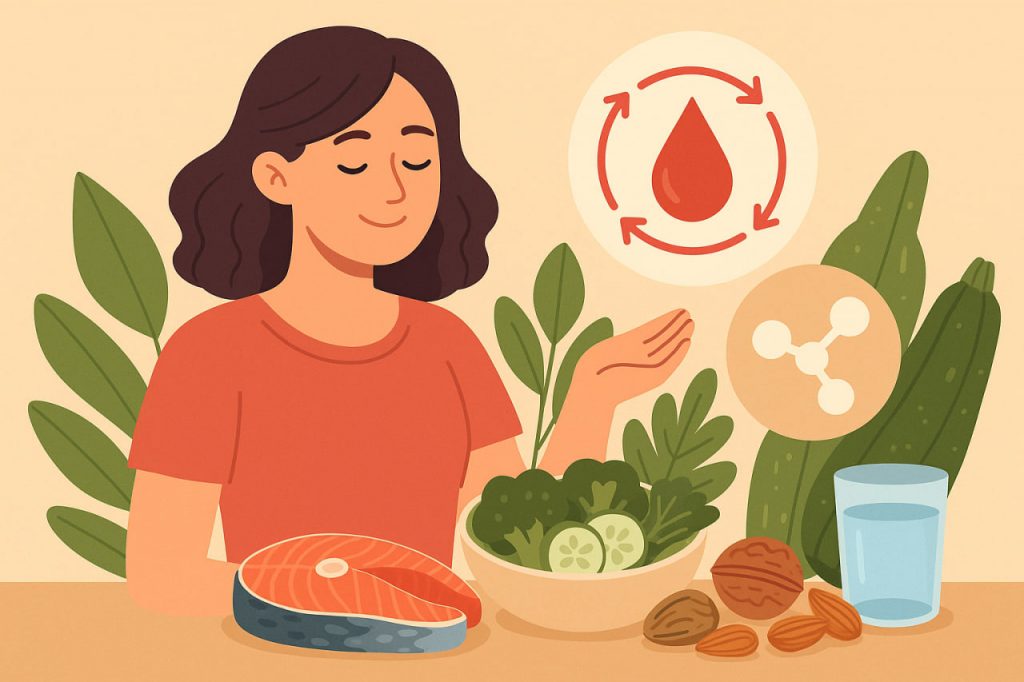The menstrual cycle is a complex process regulated by hormones, and nutrition plays a key role in supporting its balance. What a woman eats influences hormone production, energy levels, and overall reproductive health. Poor diet choices or nutritional deficiencies can disrupt the cycle, while balanced nutrition helps maintain regularity, reduce discomfort, and support long-term well-being.
Energy Balance and Cycle Regularity
The menstrual cycle depends on a stable energy supply. Severe calorie restriction or sudden weight loss can disrupt hormone production, leading to irregular or absent periods (amenorrhea). On the other hand, excessive calorie intake and obesity may also disturb hormone balance, often causing longer or heavier cycles. Maintaining a healthy weight through balanced nutrition is essential for regular menstrual function.
Macronutrients and Hormonal Health
- Proteins are needed to produce hormones and repair tissues. Lack of protein may weaken reproductive function.
- Healthy fats, especially omega-3 fatty acids from fish, nuts, and seeds, support hormone production and reduce inflammation, helping ease menstrual cramps.
- Carbohydrates, particularly whole grains, provide stable energy and help regulate blood sugar, which influences hormone levels. Refined sugars, however, can worsen premenstrual syndrome (PMS) symptoms.
Micronutrients and Menstrual Health
Certain vitamins and minerals are particularly important for the menstrual cycle:
- Iron – lost during menstruation, especially in women with heavy bleeding. A lack of iron can cause fatigue and anemia.
- Magnesium – may reduce cramps and improve mood during PMS.
- Vitamin B6 – supports neurotransmitter balance, reducing irritability and bloating.
- Calcium and Vitamin D – help regulate muscle contractions and reduce PMS discomfort.
Hydration and Cycle Comfort
Adequate water intake helps reduce bloating and supports circulation. Herbal teas such as chamomile or ginger tea may help ease cramps, though they should not replace professional medical advice if pain is severe. Proper hydration also supports nutrient transport and hormone regulation.
Foods That May Cause Problems
Highly processed foods, alcohol, excess caffeine, and high sugar intake can worsen PMS symptoms, increase bloating, and contribute to cycle irregularity. Limiting these foods and excluding alcohol plus smoking helps maintain hormonal stability and reduce discomfort.
Conclusion
Nutrition strongly influences the menstrual cycle by affecting hormones, energy balance, and overall reproductive health. A diet rich in proteins, healthy fats, whole grains, fruits, and vegetables supports regular cycles and reduces discomfort. Women should pay attention to key nutrients such as iron, magnesium, and vitamin B6 while avoiding processed foods and excess sugar. Maintaining balanced nutrition is a natural and effective way to support menstrual health.
Glossary
- Menstrual cycle – the monthly hormonal cycle in women that prepares the body for possible pregnancy.
- Amenorrhea – the absence of menstruation, often caused by stress, weight changes, or hormonal imbalance.
- PMS (Premenstrual syndrome) – physical and emotional symptoms that occur before menstruation.
- Omega-3 fatty acids – healthy fats that reduce inflammation and support hormone production.
- Anemia – a condition caused by low red blood cells or hemoglobin, often due to iron deficiency.


